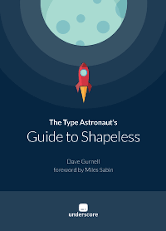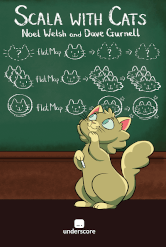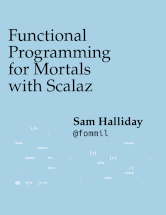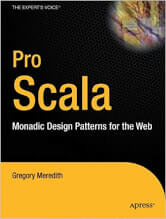Last Updated on May 22, 2022
5. The Type Astronaut’s Guide to Shapeless Book by Dave Gurnell

The book is divided into two parts. Part I introduces the general mechanisms for type class derivation in shapeless. It introduces generic encodings of product and coproduct types (case classes and sealed traits), and shows how to implement type classes by solving problems at the generic level.
Part II opens the shapeless toolbox and show how to apply the solutions from Part I to a wider range of situations. The author introduces polymorphic functions that let us map and flatMap over generic representations, and show how we can count at the type level.
The book is published under a Creative Commons Attribution-NonCommercial-ShareAlike 4.0 International License.
6. Scala with Cats by Noel Welsh and Dave Gurnell
 The main goal of this book is to teach system architecture and design using the techniques of modern functional programming. This means designing systems as small composable units, expressing constraints and interactions via the type system, and using composition to guide the construction of large systems in a way that maintains the original architectural vision.
The main goal of this book is to teach system architecture and design using the techniques of modern functional programming. This means designing systems as small composable units, expressing constraints and interactions via the type system, and using composition to guide the construction of large systems in a way that maintains the original architectural vision.
The book also serves as an introduction to the Cats library. The authors use abstractions from Cats, and explain the structure of Cats so you can use it without fear in your own code base. The broad ideas are not specific to Cats, but Cats provides an excellent implementation that is beneficial to learn in its own right.
7. Functional Programming for Mortals with Scalaz by Sam Halliday
 Functional Programming for Mortals with Scalaz bills itself as a comprehensive and practical introduction to Functional Programming for Scala developers.
Functional Programming for Mortals with Scalaz bills itself as a comprehensive and practical introduction to Functional Programming for Scala developers.
This book is for the typical Scala developer, probably with a Java background, who is both skeptical and curious about the Functional Programming (FP) paradigm.
This book justifies every concept with practical examples, including writing a web application.
8. Pro Scala: Monadic Design Patterns for the Web by L.G. Meredith
 Already know some Scala, but want to take the next step and make practical use of modern monadic design patterns? This is the book for you.
Already know some Scala, but want to take the next step and make practical use of modern monadic design patterns? This is the book for you.
This book addresses advanced programming techniques in Scala from the point of view of design patterns for web development. These patterns are discussed across the whole of the processing pipeline, from HTTP requests to storage and back again.
Major emphasis is placed on key abstractions from functional programming that are often considered out of the purview of the professional programmer, but that are of key practical importance.
Next page: Page 3 – Scala & Design Patterns: Exploring Language Expressivity and more books
Pages in this article:
Page 1 – Programming in Scala and more books
Page 2 – The Type Astronaut’s Guide to Shapeless Book and more books
Page 3 – Scala & Design Patterns: Exploring Language Expressivity and more books
All books in this series:
| Free Programming Books | |
|---|---|
| Ada | ALGOL-like programming language, extended from Pascal and other languages |
| Agda | Dependently typed functional language based on intuitionistic Type Theory |
| Arduino | Inexpensive, flexible, open source microcontroller platform |
| Assembly | As close to writing machine code without writing in pure hexadecimal |
| Awk | Versatile language designed for pattern scanning and processing language |
| Bash | Shell and command language; popular both as a shell and a scripting language |
| BASIC | Beginner’s All-purpose Symbolic Instruction Code |
| C | General-purpose, procedural, portable, high-level language |
| C++ | General-purpose, portable, free-form, multi-paradigm language |
| C# | Combines the power and flexibility of C++ with the simplicity of Visual Basic |
| Clojure | Dialect of the Lisp programming language |
| ClojureScript | Compiler for Clojure that targets JavaScript |
| COBOL | Common Business-Oriented Language |
| CoffeeScript | Transcompiles into JavaScript inspired by Ruby, Python and Haskell |
| Coq | Dependently typed language similar to Agda, Idris, F* and others |
| Crystal | General-purpose, concurrent, multi-paradigm, object-oriented language |
| CSS | CSS (Cascading Style Sheets) specifies a web page’s appearance |
| D | General-purpose systems programming language with a C-like syntax |
| Dart | Client-optimized language for fast apps on multiple platforms |
| Dylan | Multi-paradigm language supporting functional and object-oriented coding |
| ECMAScript | Best known as the language embedded in web browsers |
| Eiffel | Object-oriented language designed by Bertrand Meyer |
| Elixir | Relatively new functional language running on the Erlang virtual machine |
| Erlang | General-purpose, concurrent, declarative, functional language |
| F# | Uses functional, imperative, and object-oriented programming methods |
| Factor | Dynamic stack-based programming language |
| Forth | Imperative stack-based programming language |
| Fortran | The first high-level language, using the first compiler |
| Go | Compiled, statically typed programming language |
| Groovy | Powerful, optionally typed and dynamic language |
| Haskell | Standardized, general-purpose, polymorphically, statically typed language |
| HTML | HyperText Markup Language |
| Icon | Wide variety of features for processing and presenting symbolic data |
| J | Array programming language based primarily on APL |
| Java | General-purpose, concurrent, class-based, object-oriented, high-level language |
| JavaScript | Interpreted, prototype-based, scripting language |
| Julia | High-level, high-performance language for technical computing |
| Kotlin | More modern version of Java |
| LabVIEW | Designed to enable domain experts to build power systems quickly |
| LaTeX | Professional document preparation system and document markup language |
| Lisp | Unique features - excellent to study programming constructs |
| Logo | Dialect of Lisp that features interactivity, modularity, extensibility |
| Lua | Designed as an embeddable scripting language |
| Markdown | Plain text formatting syntax designed to be easy-to-read and easy-to-write |
| Objective-C | Object-oriented language that adds Smalltalk-style messaging to C |
| OCaml | The main implementation of the Caml language |
| Pascal | Imperative and procedural language designed in the late 1960s |
| Perl | High-level, general-purpose, interpreted, scripting, dynamic language |
| PHP | PHP has been at the helm of the web for many years |
| PostScript | Interpreted, stack-based and Turing complete language |
| Prolog | A general purpose, declarative, logic programming language |
| PureScript | Small strongly, statically typed language compiling to JavaScript |
| Python | General-purpose, structured, powerful language |
| QML | Hierarchical declarative language for user interface layout - JSON-like syntax |
| R | De facto standard among statisticians and data analysts |
| Racket | General-purpose, object-oriented, multi-paradigm, functional language |
| Raku | Member of the Perl family of programming languages |
| Ruby | General purpose, scripting, structured, flexible, fully object-oriented language |
| Rust | Ideal for systems, embedded, and other performance critical code |
| Scala | Modern, object-functional, multi-paradigm, Java-based language |
| Scheme | A general-purpose, functional language descended from Lisp and Algol |
| Scratch | Visual programming language designed for 8-16 year-old children |
| SQL | Access and manipulate data held in a relational database management system |
| Standard ML | General-purpose functional language characterized as "Lisp with types" |
| Swift | Powerful and intuitive general-purpose programming language |
| Tcl | Dynamic language based on concepts of Lisp, C, and Unix shells |
| TeX | Markup and programming language - create professional quality typeset text |
| TypeScript | Strict syntactical superset of JavaScript adding optional static typing |
| Vala | Object-oriented language, syntactically similar to C# |
| VHDL | Hardware description language used in electronic design automation |
| VimL | Powerful scripting language of the Vim editor |
| XML | Rules for defining semantic tags describing structure ad meaning |
